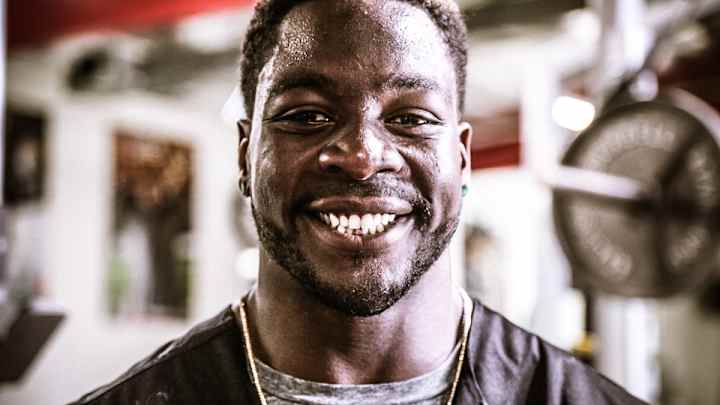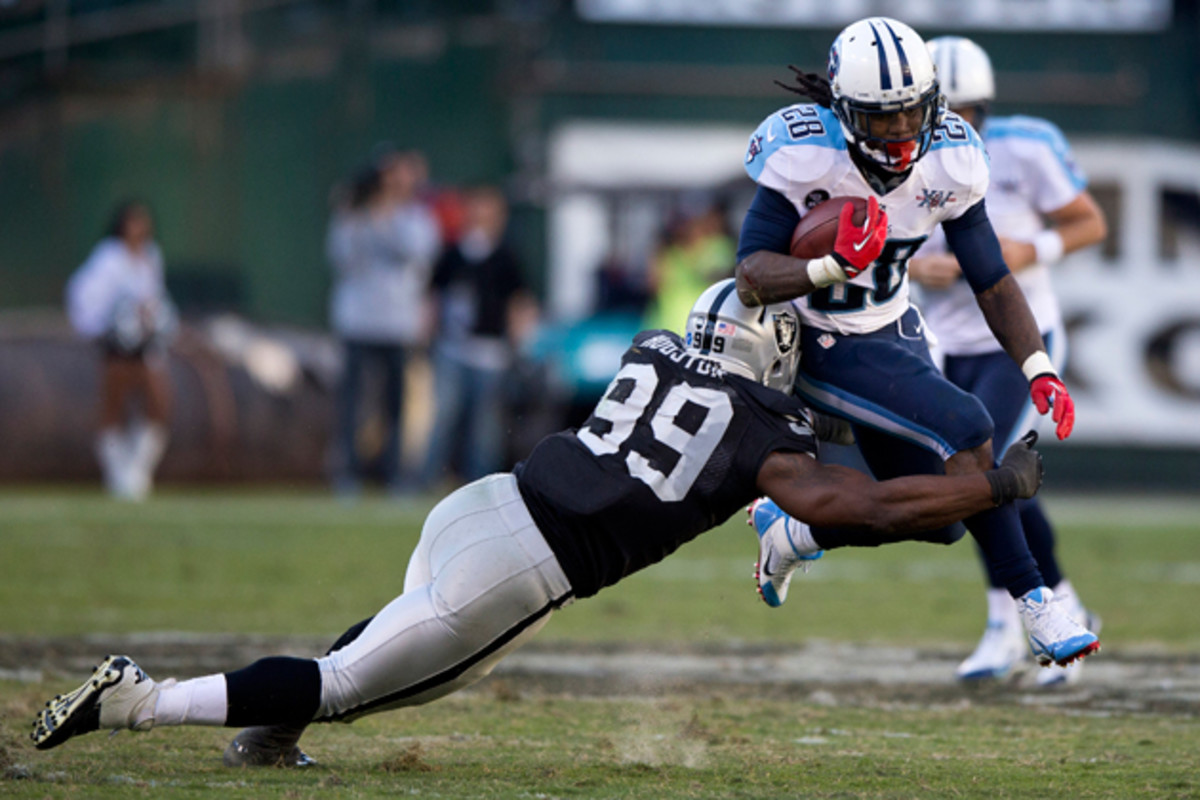New role in Chicago means whole new weight class for Lamarr Houston

LOS ANGELES -- Generally speaking, when NFL players are working to lose weight in the offseason, it's a slightly desperate reaction to months of eating too much, partying too hard and rarely thinking about football. It's not like it was in the 1960s and '70s, when players had jobs in the offseason and non-football training was embryonic at best, but the perception is that when players hit training camp, there are those who need to crash through their own fat-laden ceilings before they can really get to work. True in a few cases, but in the modern NFL, if you're not in shape all year long, you generally won't last long.
MORE COVERAGE: Top-10 CBs | Top-10 D-lineman | Top-10 pass rushers
More common these days is the player who may have to add or subtract weight to deal with new positional responsibilities. Whether it's due to a change of team or scheme, some guys will essentially have to change their entire shapes -- and if they don't do it the right way, it's no better than what would happen if they hung out at the buffet all summer.
Defensive lineman Lamarr Houston has never been one to head back for thirds; certainly not during his five-year NFL career. Houston came to the 2010 scouting combine out of Texas at 6-foot-3 and 305 pounds, and that's the weight he played at during his rookie season with the Raiders, who selected him in the second round. Houston started out as a defensive tackle who could kick out to end in Oakland's hybrid schemes. But over the years, he kept dropping weight, and in 2013, he essentially played as an outside pass-rushing linebacker -- at 275 pounds.
Clearly, that weight loss didn't affect his game. Last season, Houston totaled a career-high six sacks, adding 16 quarterback hits and 41 quarterback hurries for his trouble. Despite starting the offseason with more than $60 million in salary cap space, the Raiders decided to let Houston test the free market, and he wound up signing a five-year, $35 million deal with the Chicago Bears, whose 2013 defensive line was all kinds of disastrous.
Houston won't play that old tackle/end role in Chicago, nor will he line up with his hand off the ground outside the tackle as he did in 2013. The Bears see him as the logical replacement to Julius Peppers, who bailed for Green Bay in the offseason. So, as he's done since he trained for the combine, Houston came back to Travelle Gaines' gym in Los Angeles and got to work. When I spoke with him last week, I wondered what Gaines had done with the rest of him -- Houston was down to 268 pounds, and over the last four years, he'd dropped his body fat from 15 to 8 percent.
The question is, how do you drop so much weight and maintain the functional strength required to deal with NFL opponents? For Houston, it's always been about the plans he and Gaines have put together.
Travelle Gaines: From Humble Beginnings to Elite NFL Trainer
"Well, it starts right from the diet," Houston told me. "That's really important. What you're putting in your body to burn fuel throughout the day and to speed up your metabolism -- that's going to dictate how you drop weight. Do you drop weight all at once? Are you doing it little by little, or in big chunks? It can be unhealthy. So, it's really about your diet, and how you eat.
"The other key is the type of workouts you're doing. Is it more cardio, so you're just burning fat and not really building muscle, or is it high-intensity workouts that build muscle? Sustaining muscle and burning fat -- you have to look at those two things when it comes to weight loss. What's the most effective way of doing it without dropping a bunch of weight by burning muscle mass?"
Putting Houston on a high-rep, high-intensity regimen is important, but it's just as crucial that Houston understand that going from tackle to linebacker to end requires a series of different techniques, and that's something he's understood and worked on from the start. In previous years training with Gaines, Houston picked the brains of offensive tackles Ryan Clady and Donald Penn, and worked out with MMA trainer Jay Glazer. This spring and summer, he branched out.

"They've changed a lot, because I dedicated my year to working on more skill-specific stuff as a defensive end," Houston said of his workouts. "So, I worked with [pass-rush consultant] Chuck Smith. I worked with [martial arts coach] Joe Kim. I worked with Tamba Hali -- really, anybody I could work with. I sat down with Lincoln Kennedy and talked with him -- anyway I could get better this year. My skill set as a pass rusher, I took that time to make the effort. This year, I dedicated a lot of my year to football like most years, but specifically toward pass rushing."
Working with Hali, the Chiefs' sackmaster, proved to be especially beneficial. Houston has learned the ins and outs of hand moves and counters through his time in the league, but if you want to get to Hali's level, there's always more to learn.
"Working with Tamba has been one of my most fun experiences this offseason. He's a really funny guy -- really nice. He's family-oriented -- he and his girlfriend and his daughter will work out with me and my wife. And he really broke down certain things to me about the pass rush, and helped me develop that sense of how to go about attacking a guy [an offensive lineman] or breaking a guy down, and things like that. What's the mindset behind every pass-rush move, and every look. What you're trying to accomplish; why certain things make sense and others don't. It was just really helpful to me."
Of course, none of this would matter if Houston wasn't dedicated, and as Gaines says, that's something that's never changed. From relative no-name status before the draft all those years ago to his current megabucks contract, Houston has stayed on track -- and he's always looking to be better.
"There have been maybe five guys in the 300-plus guys I've trained for the combine who haven't changed from the day I met them until now," Gaines told me. "Lamarr Houston just signed for $35 million, and he says, 'Travelle, you're going to be so proud of me -- I did it big!' I said, 'What did you do?' He said, 'I bought a car!' I said, 'OK -- what did you get -- a Lamborghini? A Ferrari?' 'No -- a Jeep Cherokee! I got it painted!' And literally, as proud as a peacock about this $30,000 Cherokee he bought. And that's the kind of guy he is. But those guys are so few and far between, and that's why 80 percent of the guys in the NFL go broke."
Not Lamarr Houston. Though he did admit a weakness for the cuisine at Michael Jordan's Steakhouse in his new home city, he certainly knows when to say, "when." Now, he and the Bears will reap the benefits.
